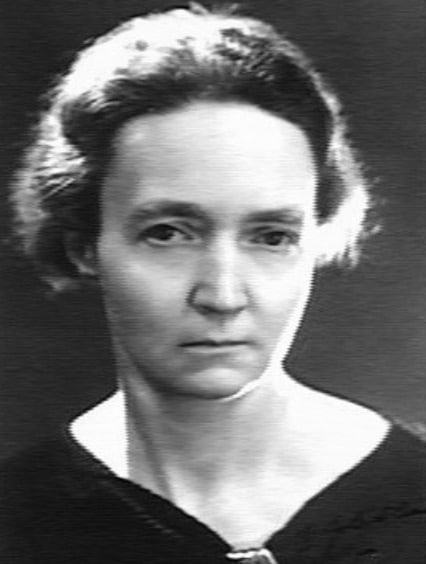
Irène Curie was born on September 12, 1897, in Paris, France, into a family of accomplished scientists. Her parents, Pierre and Marie Curie, were Nobel laureates for their groundbreaking research on radioactivity. Growing up in this environment, Irène was exposed to science from a young age. When she displayed a special aptitude for mathematics, her mother enrolled her in a home schooling program known as “The Cooperative.” This was a group of nine children from eminent French scholars who alternately taught in their homes a much more rigorous program than was offered in the public schools. From there, Irène entered Collège Sévigné from which she graduated in 1914, enrolling at age 17 in the Faculté des Sciences at the Sorbonne to complete her baccalaureate.
However, Irène’s studies were temporarily interrupted in 1916 by World War I. To assist in the war effort she took a job on the battlefield alongside her mother, serving as a nurse radiographer. Later, she transferred to a radiology facility in Belgium where she used radiography to help doctors locate shrapnel in the bodies of wounded soldiers–a service for which she would later receive a military medal.
After the war ended, Irène returned to the Sorbonne and was awarded a degree in mathematics and physics in 1918. Upon graduation, she joined her mother as a teacher of radiology at the Radium Institute that had been founded by her.parents. It was there that Irène studied the alpha decay of polonium–the element discovered by her parents. For this research, she was awarded a Doctor of Science degree in 1925.
During her doctoral studies, Irène was teaching the precision laboratory techniques required for radiochemical research. One of her students, a young physicist named Frédéric Joliot, was captivated by her radiance and in 1926 they were married, and Irène became known as Irène Joliot-Curie. Together, they formed a formidable scientific partnership and conducted groundbreaking research in the field of nuclear physics.
In 1935, Irène Joliot-Curie and Frédéric Joliot were awarded the Nobel Prize in Chemistry for their work on the synthesis of new radioactive isotopes. They discovered that certain stable elements such as aluminium and magnesium could be artificially made radioactive by bombarding them with alpha particles. This discovery had significant implications for both scientific research and medical applications.
Irène Joliot-Curie’s work on artificial radioactivity and the production of radioactive isotopes paved the way for the development of radioactive tracers. These tracers are used in various fields, including medicine and industry, to track and study chemical and biological processes. Throughout her career, Irène conducted research and delivered lectures at the Collège de France. She also became involved in the French Resistance during World War II and used her scientific expertise to contribute to the war effort.
Tragically, Irène Joliot-Curie’s life was cut short in 1956 when she died of leukemia, a disease associated with exposure to ionizing radiation. During her relatively short life, she had made significant contributions to the understanding of nuclear physics and radioactivity. Her work on artificial radioactivity had profound implications for both scientific research and medical diagnostics. Her dedication to scientific research and her pioneering work continue to be celebrated as part of her enduring legacy. As she once reflected, “True greatness is not measured by the accolades one receives, but by the impact they have on the world.”
